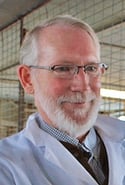In an effort to avoid abusing antibiotics, more and more researchers have been looking for alternate ways to kill or otherwise inhibit pathogens. We have seen several excellent and creative examples here in the Science Market Update, for instance exploding bacteria from the inside or even just telling bacteria not to infect us. Now a research group at The University of Wisconsin, Madison have devised a clever way to vaccinate farm animals to protect them from common troubling diseases.
 Professor of animal sciences Mark Cook is a firm believer that pursuing antibiotic production is a fruitless endeavor.
Professor of animal sciences Mark Cook is a firm believer that pursuing antibiotic production is a fruitless endeavor.
"You really can't control the bugs forever; they will always evolve a way to defeat your drugs," he says in a recent University of Madison article.
Farmers use about 80% of the nation’s antibiotics, since they seem like a cheap and effective way to suppress disease. Cook would like to change this notion and present the farming community with a non-antibiotic alternative.
His major concern is the ability of several types of bacteria and pathogens to take advantage of a particular protein called Interleukin 10 (IL-10) to disable the immune systems of chickens and cows. He found a particular antibody that protects IL-10 from such manipulation, and further discovered that vaccinating an animal with this antibody fully protected them from the diseases they were contracting previously.
The clever part of Cook’s research was to develop a cost-effective way to administer the vaccine. On a large-scale commercial farm, injecting every animal with a vaccine is quite impractical. Cook produced a spray version of his antibody that can simply be sprayed on animal feed. The animals ingest it and receive the same protection as if they had been classically vaccinated.
The team is implementing their approach in several real farms, and is quickly growing in popularity. Says Cook:
"We are getting encouraging data from dairy and beef. We have conducted experiments involving 300,000 chickens in commercial farms, half receiving the product. We know it works. The market is interested, and now it's a matter of making a product."
Cook and his colleague Sand, who have been working on the IL-10 system since 2011, are forming Ab E Discovery LLC to commercialize their research. One of the four patents they have filed through the Wisconsin Alumni Research Foundation has just been granted, and WARF has awarded a $100,000 Accelerator Program grant to the inventors to pursue the antibiotic-replacement technology. For further reading regarding funding for the University of Wisconsin, Madison and its studies, click on the link below:
Biotechnology Calendar, Inc. visits the University of Wisconsin campus for two of our BioResearch Product Faire™ events each year. Coming up this summer are our Madison University Research Park BioResearch Product Faire™ on July 16th, 2015, immediately followed by our Madison BioResearch Product Faire™ on July 17th, 2015. To attend one or both of these events, please click the button below. If you’re interested in attending a show closer to home, please look at our 2015 schedule of events.



